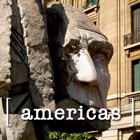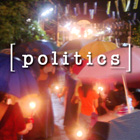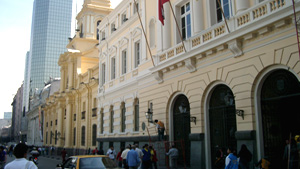
|
OUTGOING PRES. LAGOS SAYS CHILE MORE OPEN, MORE MODERN, MORE JUST 16 January 2006 Michelle Bachelet has a long and turbulent political biography. She and her mother were kidnapped and tortured by the Pinochet government, after her father was murdered for his political affiliation with the Allende government. They were forced into exile by the military regime and Bachelet has worked to restore democratic principles to Chilean government. Like Ricardo Lagos before her, also a political prisoner under Pinochet, she is a moderate socialist, intent upon leading Chile's governing center-left coalition and her nation to a prosperous future, through wholly democratic processes. Bachelet ran a campaign that promised to continue Chile's free market policies, and to increase social benefits to help reduce the gap between rich and poor, one of the largest in the world. She had served as Minister of Health and then in 2002 became the first woman to serve as Minister of Defense in a Latin American country, under the presidency of outgoing president Ricardo Lagos. She began to study medicine in 1970, in Chile, but was forced to interrupt her studies when the military coup disrupted Chilean life on 11 September 1973, and greatly impacted the future of the Bachelet family. The story of her family and what it endured under the brutality of the Pinochet regime is tragically simple: her father, an Air Force general, was given the post of head of Food Distribution under the government of Salvador Allende. When Pinochet came to power in the 1973 military coup, Alberto Bachelet was immediately arrested. He was charged with "treason" for his role in the elected government deposed by the coup. He reportedly died of cardiac arrest while in custody, though many allege he was murdered by the military regime. The president-elect's brother, Alberto, went into exile in Australia, where she and her mother joined him. Michelle Bachelet then moved with her mother, anthropologist Ángela Jeria, to East Germany, where she continued to study medicine, eventually returning to Chile in 1979. She worked with NGOs that assisted the children of those disappeared by the regime, and in 1990 began he work with the Ministry of Health in the new democratic government. She was active in the Chilean Socialist party throughout the 1970s and 1980s, helping to lead the struggle for a restoration of democracy in the late 1980s. In the 1990s she was made a member of the party's central committee, and began to run for elective office. After losing a mayoral election, she moved her support to Ricardo Lagos, whose presidency brought many former opponents of Pinochet into elective government. Her presidency, which will begin in March, is expected to be a stable continuation of present trends, with possible improvements to overall Chilean standards of living, and an experienced, pragmatic tone in diplomatic relations with world powers. She will take office in March, when she is inaugurated as Chile's first woman president, in her words "president of all Chileans". [s] |
||||||||||||||
|
|||||||||||||||


